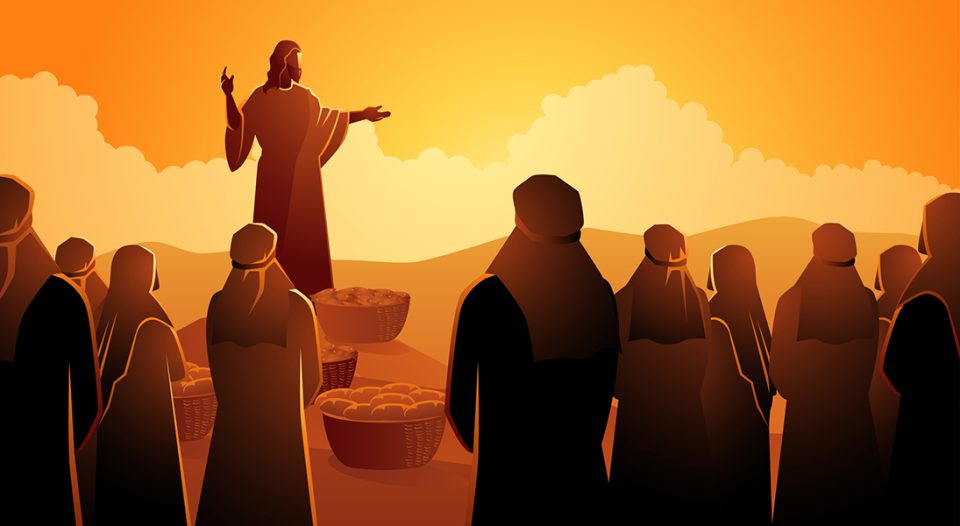Lectionary for Aug 6, 2023
Tenth Sunday after Pentecost
Isaiah 55:1-5; Psalm 145:8-9, 14-21;
Romans 9:1-5; Matthew 14:13-21
One of my favorite seminary professors, Joy J. Moore, used to say, “When you preach, make sure it’s not all ‘pie in the sky,’ but give me some ‘chicken in the kitchen’ and ‘ham where I am.” All too often some Christians focus on God’s spiritual work to the exclusion of God’s material work. This week, the lectionary helps us reframe and refocus on the works of God as both spiritual and material.
The appointed Psalm brings one of the most beautiful portraits of God’s care for creation. The psalmist proclaims that all eyes look to God and that God feeds them in their due time (Psalm 145:15). There is no reason to limit this understanding of God’s provision to humans only. If God provides for our needs, certainly, and maybe even more so, God provides for the wild things of this earth.
Then the psalmist provides a stunning image of God opening the divine hand to satisfy the desires of all living things. This is an opportunity to lean into the frequent biblical language about God’s body and how God chooses to use it. As one example, God’s arms are mighty to save (Exodus 6:6, Deuteronomy 5:15, Isaiah 59:1, Luke 1:51, Acts 13:17, John 12:38). Here we have the image of God lowering a divine palm, heaped and overflowing with desirable food, to feed all life, as a child would feed a beloved pet.
As often happened, crowds came out from the cities to find Jesus to both hear about the kingdom of heaven and to have their needs met.
Next we turn to a famous passage in Isaiah about God’s provision. God, through the prophet, challenges people to truly and unabashedly receive gracious provision. Why spend money for that which does not satisfy? Why not instead receive the bread, water, milk and wine that God provides for free? Often, as I’ve preached on this passage, I’ve spiritualized it, seeing this as an allusion to God’s free mercy and grace. And that may well be what is in view here. But for those hearing the prophet’s words as a populace returning from captivity and exile and looking to establish homes and livelihoods, receiving free food and drink was grace and mercy. How often are we preaching “pie in the sky” when people need “chicken in their kitchen”? It doesn’t have to be an either/or proposition, as Jesus points out.
After Jesus was told about the political assassination of his relative, John the Baptizer, he tried to find a secluded place to be alone with his thoughts. As often happened, crowds came out from the cities to find Jesus to both hear about the kingdom of heaven and to have their needs met. Jesus met the crowd with compassion and healed the sick among them. Yet, after a long day of healing, he wasn’t finished providing for the people. Instead of sending them away to buy food, as the disciples had suggested, Jesus multiplied bread and fish to feed 5,000 men, in addition to all the women and children (Matthew 14:21).
Now, as often happens, folks will hurry to talk about the symbolism of the action. Maybe the five loaves are the five books of the Torah and the two fish are the two great prophets Moses and Elijah. And maybe the crowd for this feeding was mostly/exclusively Jews from the Galilee, symbolized by the 12 baskets of leftovers. Maybe this should be contrasted with the seven loaves (seven Noahide laws?) and a “few small fish” (maybe lesser prophets who spoke to Gentiles?) that Jesus multiplies for the crowd of 4,000 men, plus women and children, in the next chapter of Matthew. Maybe the seven large baskets of leftover food symbolize the Gentiles as seven nations driven out of the land. Maybe, maybe, maybe .…
Matthew (and Mark) is careful to describe the story of Jesus multiplying food for thousands of people, on multiple occasions, with multiple baskets of leftovers that shouldn’t be wasted. We can (and should!) study symbolism and meanings in the actions of the great parable-teller from Galilee. While doing so, we also must not lose sight of the forest for the trees. Jesus had compassion on hungry people and used his God-given power to feed them!
We are Christians because of God’s grace, to be sure. As we share grace with those around us, let us never separate spiritual grace from material grace. God doesn’t. Jesus doesn’t. Scripture doesn’t. God serves up pie in the sky and chicken in your kitchen. Let us do the same.





